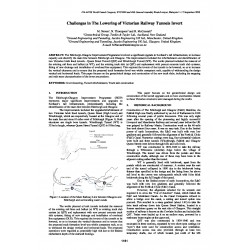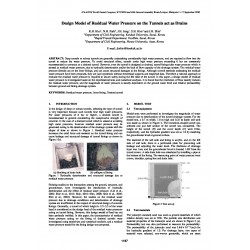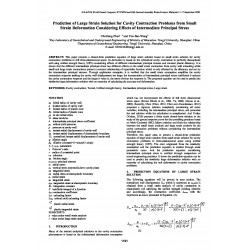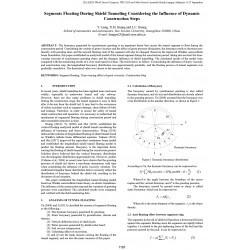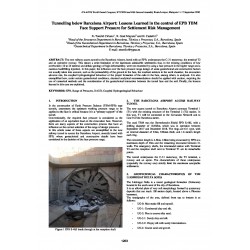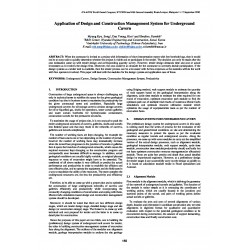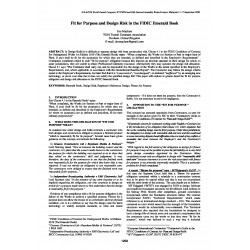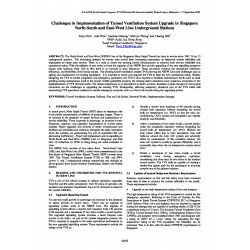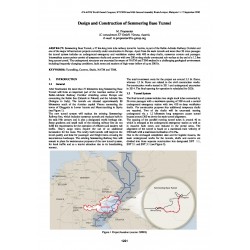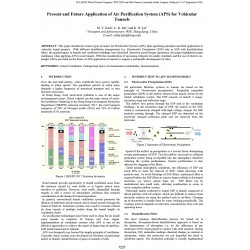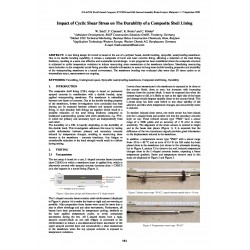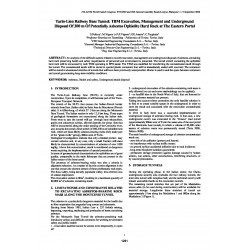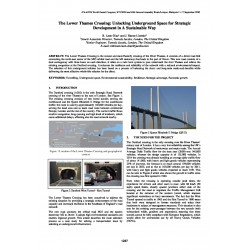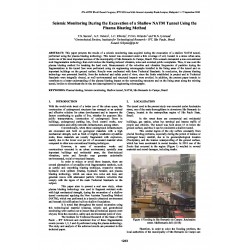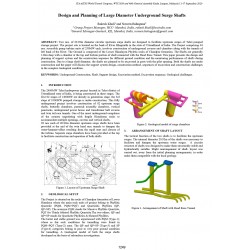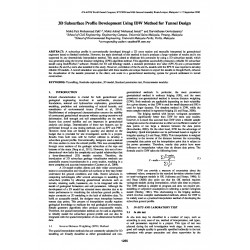No document
Search & filter
Search for a publication
Search & filter
World Tunnelling Congress
WTCThere are 1984 documents.
-
Challenges in the Lowering of Victorian Railway Tunnels Invert
Abstract: The Edinburgh-Glasgow Improvement Programme involved a significant upgrade to Scotland’s rail infrastructure, to increase capacity and electrify the main line between Edinburgh and Glasgow. The improvements included the refurbishment and electrification of two Victorian brick lined tunnels - Queen Street Tunnel (QST) and Winchburgh Tunnel (WT). The works planned included the removal of the...
0,00 € -
Design Model of Residual Water Pressure on the Tunnels act as Drains
Abstract: Deep tunnels or subsea tunnels are generally undertaking considerably high water pressure, and are required to flow into the tunnel to reduce the water pressure. To avoid structural effect, tunnels under high water pressure exceeding 6 bar are commonly recommended to construct as a drained tunnel. However, even the tunnel is designed as drained, tunnel linings take water pressure which is...
0,00 € -
Prediction of Large Strain Solution for Cavity Contraction Problems from Small Strain Deformation Considering Effects...
Abstract: This paper presents a closed-form prediction equation of large strain solution based on small strain solution for cavity contraction problems in full three-dimensional space. Its derivation is based on the cylindrical cavity contraction in perfectly elastoplastic soil using unified strength theory (UST) considering effects of different intermediate principal stresses and constant plastic...
0,00 € -
Segments Floating During Shield Tunneling Considering the Influence of Dynamic Construction Steps
Abstract: The buoyancy generated by synchronous grouting is an important factor that causes the tunnel segment to float during the construction period. Considering the variety of grout viscosity and the effect of grout pressure dissipation, the buoyancy tends to decrease nonlinearly with grouting time, and the upward floating state of the segment will also be changed. Based on the improved Winkler...
0,00 € -
Tunnelling below Barcelona Airport: Lessons Learned in the Control of EPB TBM Face Support Pressure for Settlement...
Abstract: The new railway access tunnel to the Barcelona Airport, bored with an EPB, underpasses the C-31 motorway, the terminal T2 and an operative runway. This meant a strict limitation of the maximum admissible settlements that, in the existing conditions of low overburden (10 to 25 meters) and deltaic geology of high deformability, were not exceeded by using a face pressure in the higher range and a...
0,00 € -
Application of Design and Construction Management System for Underground Cavern
Abstract: When the contractor is invited to a project with information of short interpretation report with few borehole logs, then it would not be an easy task to quickly determine whether the project is viable and to participate in the tender. The decision can only be made after the cost estimation came up with tender design and corresponding quantity survey. However, tender design demands time and cost...
0,00 € -
Fit for Purpose and Design Risk in the FIDIC Emerald Book
Abstract: In Design-Build it is difficult to separate design risk from construction risk. Clause 4.1 in the FIDIC Conditions of Contract for Underground Works 1st Edition 2019 (The Emerald Book) states “When completed, the Works (or Section or Part or major item of Plant, if any) shall be fit for the purpose(s) for which they are intended, as defined and described in the Employer’s Requirements” ....
0,00 € -
Challenges in Implementation of Tunnel Ventilation System Upgrade in Singapore North-South and East-West Line...
Abstract: The North-South and East-West (NSEW) Line of the Singapore Mass Rapid Transit has been in service since 1987. It has 15 underground stations. The increasing demand for shorter train arrival time, increasing expectation on improved system reliability and expectation of better train service. There is a need to renew the existing transit infrastructures to enhance train service reliability and...
0,00 € -
Design and Construction of Semmering Base Tunnel
Abstract: Semmering Base Tunnel, a 27 km long twin tube railway tunnel in Austria, is part of the Baltic-Adriatic Railway Corridor and one of the major infrastructure projects currently under construction in Europe. Apart from the main tunnels and more than 50 cross passages the tunnel system includes an underground emergency and ventilation station with 400 m deep shafts, numerous caverns and passages....
0,00 € -
Present and Future Application of Air Purification System (APS) for Vehicular Tunnels
Abstract: This paper introduced various types of major Air Purification System (APS), their operating principles and their application in vehicular tunnel projects. With different installation arrangements (i.e. Electrostatic Precipitator (ESP) only or ESP with denitrification filter), the spatial impact to tunnels and ventilation buildings were described. Based on actual design experience, this paper...
0,00 € -
Impact of Cyclic Shear Stress on the Durability of a Composite Shell Lining
Abstract: A new lining design for tunnel is based on the use of a polymer based, double bonding, sprayable, waterproofing membrane. Due to its double bonding capability, it creates a composite of inner and outer concrete lining, allowing a reduction of the total lining thickness, resulting in a more cost effective and sustainable tunnel design. A test program has been established where the composite...
0,00 € -
Turin-Lion Railway Base Tunnel: TBM Excavation, Management and Underground Disposal of 300 M of Potentially Asbestos...
Abstract: An analysis of the difficult aspects related to tunnel excavation, management and underground disposal of asbestos-containing hard rock preserving health and safety requirements of personnel and environment is presented. The tunnel stretch containing the ophiolitic hard rock will be excavated by rock TBM operating in EPB mode. The TBM was modified for transferring the contaminated muck through...
0,00 € -
The Lower Thames Crossing: Unlocking Underground Space for Strategic Development in a Sustainable Way
Abstract: The Lower Thames Crossing is the newest and most Easterly crossing of the River Thames, it consists of a direct road link connecting the north-east sector of the M25 orbital road and the M2 motorway that leads to the port of Dover. This new road consists of a dual carriageway with three lanes on each direction, it relies on a twin bore system to pass underneath the river Thames and relieve the...
0,00 € -
Seismic Monitoring During the Excavation of a Shallow NATM Tunnel Using the Plasma Blasting Method
Abstract: This paper presents the results of a seismic monitoring data acquired during the excavation of a shallow NATM tunnel, performed using the plasma blasting technology. This tunnel was excavated under a thin coverage of soil, located in a dense urban area, under one of the most important avenues of the municipality of São Bernardo do Campo, Brazil. This scenario demanded a non-conventional rock...
0,00 € -
Design and Planning of Large Diameter Underground Surge Shafts
Abstract: Two nos. of 20.92m diameter circular upstream surge shafts are designed to facilitate upstream surges of Tehri pumped storage project. The project site is located on the bank of River Bhagirathi in the state of Uttarakhand of India. The Project comprising 04 nos. reversible pump turbine units of 250MW each, involves construction of underground caverns and chambers along with the tunnels of left...
0,00 € -
3D Subsurface Profile Development Using IDW Method for Tunnel Design
Abstract: A subsurface profile is conventionally developed through a 2D cross section and manually interpreted by geotechnical engineers based on limited boreholes. However, the main drawback of this method is that it produces a large variation of results and is not supported by any deterministic interpolation method. This study aimed to eliminate this constraint by using a 3D subsurface model, which was...
0,00 €

